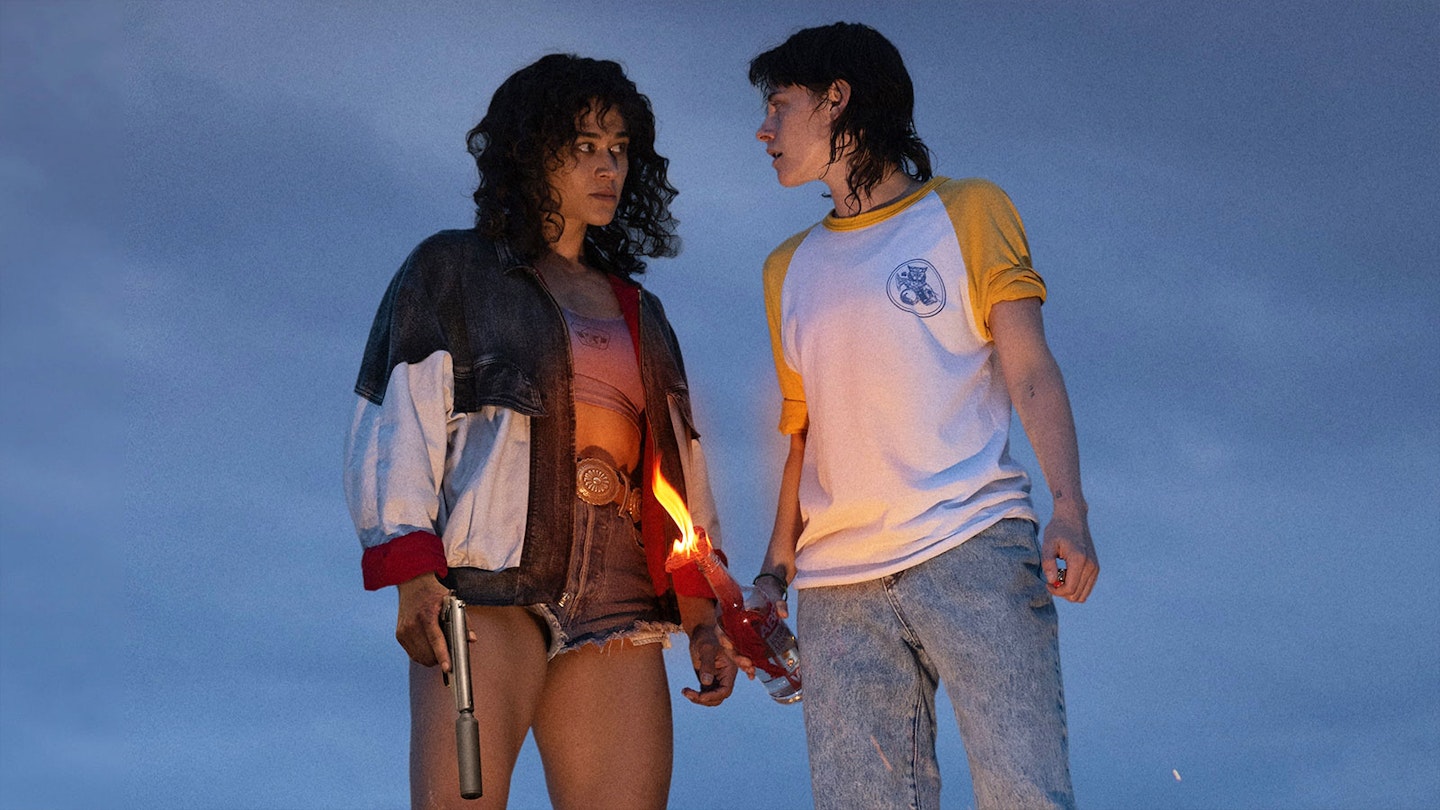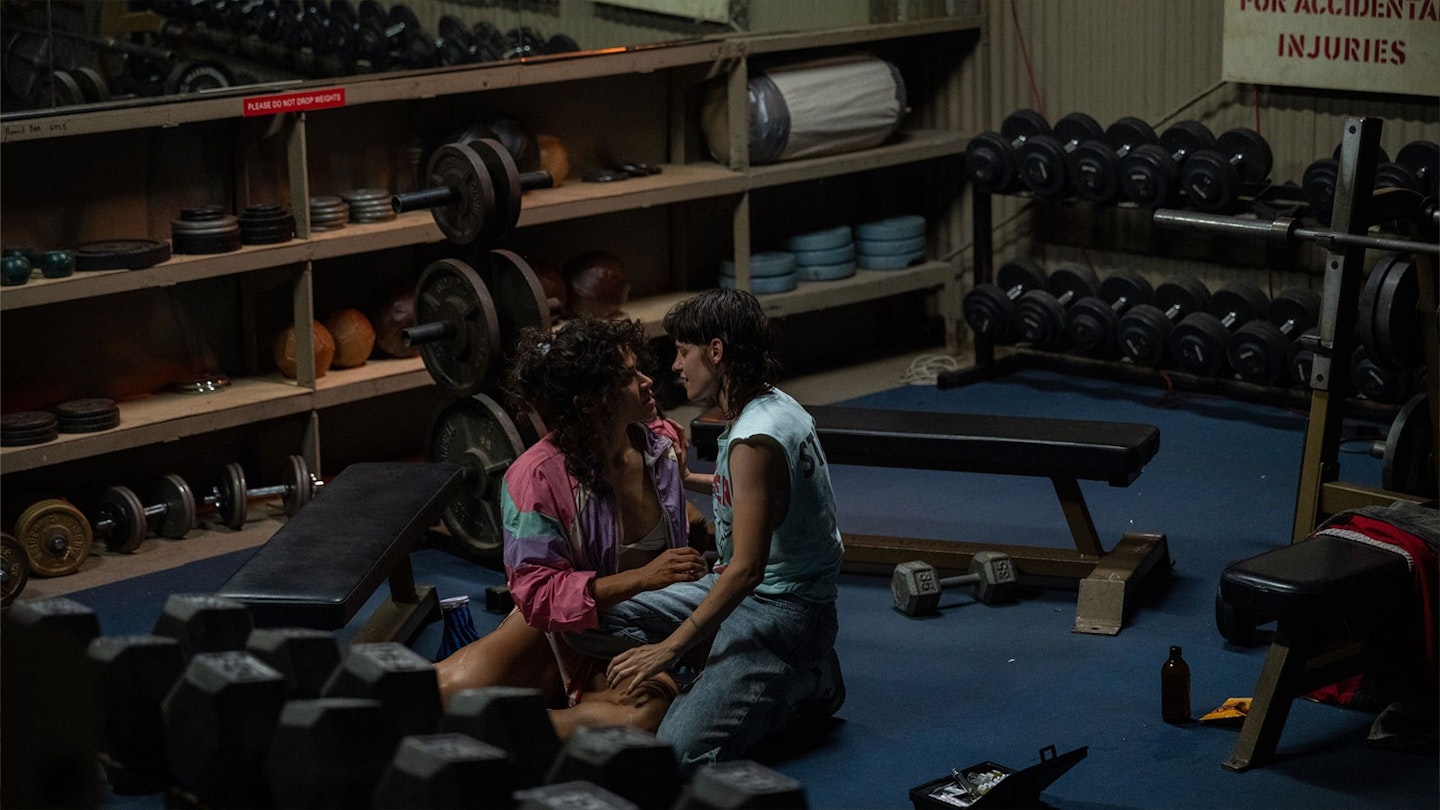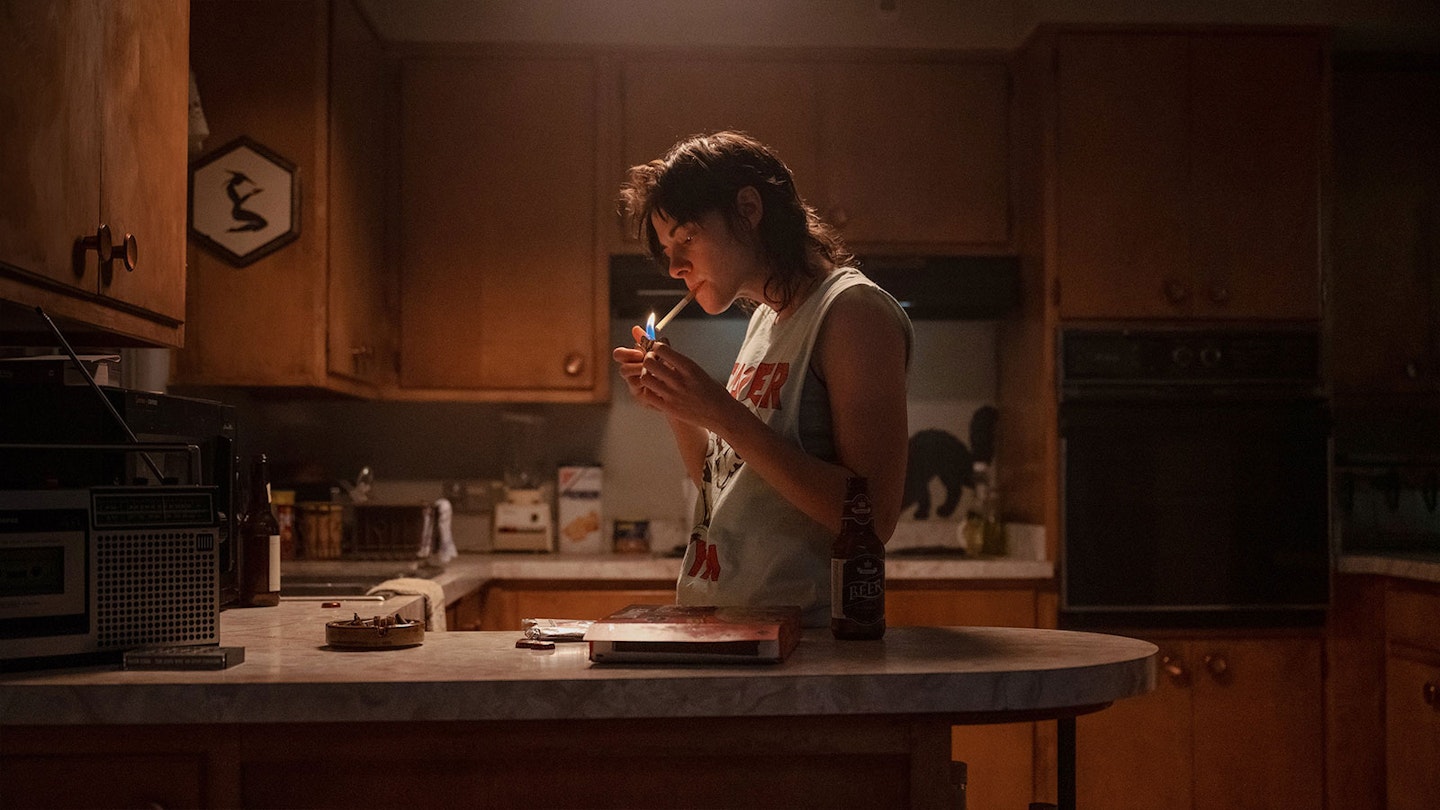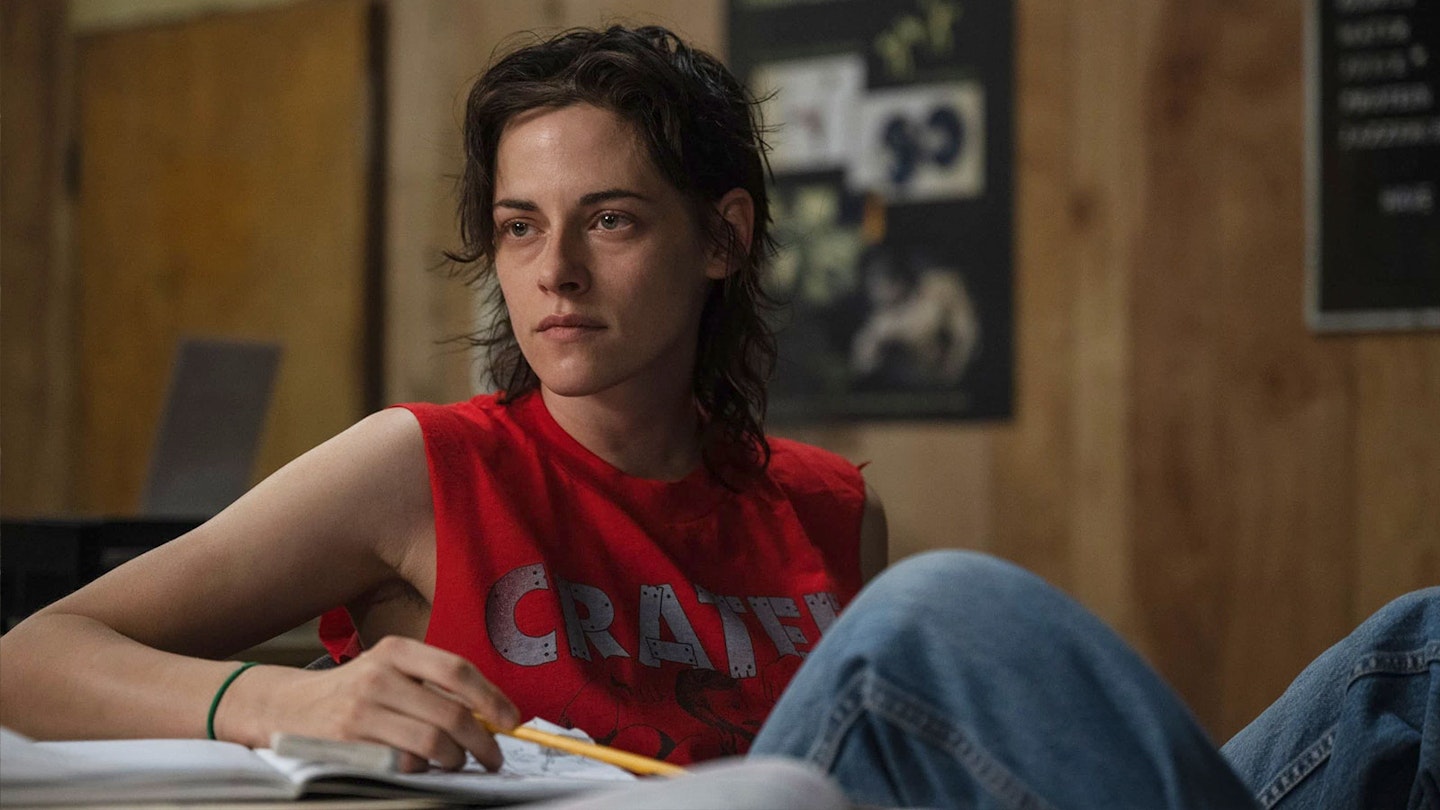If there’s one thing you can say about Kristen Stewart, it’s that she refuses to be pigeon-holed. From a kid hiding from home-invaders in Panic Room, to the centre of a supernatural love-triangle in the Twilight saga, to thoughtful indie dramas like Personal Shopper or channelling the people’s princess in Spencer, Stewart has ran the gamut throughout her career, playing in all kinds of genres and with all kinds of characters.
With Love Lies Bleeding, though, the pulpy new revenge thriller from Saint Maud director Rose Glass, we’re seeing yet another whole new side to her. She is gym manager Lou, an androgynous lesbian stuck in a small town, trying and failing to cut ties with her criminal father – that is, until bodybuilder Jackie [Katy O’Brian] arrives, and shakes up her entire world. Here, Stewart tells Empire about what makes Lou so different to herself, why she was so excited to work with Glass, and digs into the knotty themes that make her new movie a must-see.

EMPIRE: What was your reaction when you saw Rose Glass’ first film, Saint Maud?
Kristen Stewart: I love that movie so much. It's so perfectly constructed and so unruly and scary and hilarious. You both love and hate the main character, and then in turn, understand that you probably love and hate yourself. If you let the movie sit for a while in you, and you realise what it's about, you go ‘Wow, I think that person is a genius?’ So I was just like, ‘What is [Glass] doing?’ Coincidentally, she had also been wondering what I was doing. She told me that she was working on something about a really strong woman, because she had been encouraged by the industry that we function within to do that. I guess that's an easy way for people to feel good about greenlighting movies – if we overcome adversity, and are like a walking affirmation. So she was like, ‘I'll give you a fucking walking affirmation!’
What made Love Lies Bleeding a ‘yes’ for you?
Stewart: I was willing to follow her wherever she was going. In that initial meeting, I was really amused and impressed by her irreverent response to the idea of being allowed to make a second movie. She was probably being pushed in certain directions. It was cool, because the way that she dealt with that was by being a little petulant, and ironic and hilarious, which is what she is. So what she came up with was this. She thought, ‘Let's really fall from that, and really, really bust our chins open on that idea.’ I think the movie is like, if you love something enough, you'll do absolutely anything to justify it. Or protect it.

You and Rose really collaborated in developing Lou and getting the film in production. What did that involve?
Stewart: From a logistical standpoint, it was always riding on us as a combo. We had to cast a very specifically-bodied person, and we got so lucky when we found Katy [O’Brian]. Between the three of us, I don't know that we were all necessarily having the same conversation when talking about the movie. We were all coming from a different standpoint, and so it feels a little disparate. It feels like this bag of want, and this bag of love and also fear and self hate and a lot of internalised misogyny, and a lot of rage and a lot of violence. The female experience is steeped in violence. So it's how to turn that around and enjoy it, or turn it around and seek revenge, and have it not be so dark, have it be something that is hilarious.
We are constantly watching movies about women who are overcoming adversity. I'm so sick of that fucking movie!
We are constantly watching movies about women who are facing adversity and overcoming it, triumphing over oppressive forces because we're somehow ethically superior, morally superior. It's like, ‘No, fuck that’. I'm so sick of that. I'm so sick of that fucking movie! This one just felt like we were allowed to pull our dress over our head and run down the street, use the boys’ toys and shove them in their faces, and then also be like, ‘We're nothing like you.’
Rose has described Lou as an ‘embodiment of inertia’, which feels quite at odds with a lot of your previous roles. Was that what drew you to her?
Stewart: This girl, in particular, would normally never be the protagonist in a film. She would be the weird friend that underlined some kind of otherness, that was not at the forefront. She's invisible. She doesn't exist for anyone but herself. When she sees Jackie, it's so audacious. It's so gross. It's so icky for everyone that she's used to. There's just something that all of a sudden stirs the pot, and you're like, ‘Oh, this pot is filled with so much muck’. All she wants to do is have a good time with a girl and not think about any of those things – but they're all coming for her. All of her familial violence and history, it's not going to go away. Maybe the reason it's fun for me to be in this is because I am such a runner. I really don't like to stop. I like forward motion, and so it feels like that stuckness is really opposed to my nature. You feel like you want this girl to emotionally Heimlich manoeuvre herself into being. It's just satisfying.

The movie isn’t shot from the traditional perspective of a male gaze, but from a queer woman’s one. Is that something you were conscious of whilst making it?
Stewart: I was so excited about it. It's not even that explicit. The sex scenes are not very long, but they are direct and realistic and vocal, and we talk about each other's bodies. That, I think, makes people squirm – to talk about the actual dreaded orifice. It can sound like these scenes are too much to handle, but it's just that you haven't seen them in movies yet. In these sex scenes, it's about power – subverting it, toying with it. There's always a power dynamic that charges a sexual dynamic, and it's just so interesting between two women, especially when one is extremely ‘strong’, and the other is quite frail. It was so fun to have this person be at the forefront of a film, and not have it be about how hard it is to be gay.
Lou has a combative relationship with her father, Lou Sr., played by Ed Harris. How did you both create that tension?
Stewart: [Lou] despises him, but she is him. All her strengths, all of the cool things about her, really, she you can see she got from her dad. And then all of the things that she's most afraid of being are also from him. So he was kind of present in every scene. I was thinking about him all the time. I was constantly aware that I wasn't telling my girlfriend the whole truth, and that I'm harbouring all of this internalised violence and misogyny, trying to not let it consume me. Then, ultimately, it fucking does.

You signing on was such a big part of getting Love Lies Bleeding made. How important is it to you to keep working with newer talent? Is that something that you're constantly seeking out?
Stewart: Oh, absolutely. I definitely don't need my career to be on any kind of perfect path. I want to help people find their voice. I want to excavate newness and otherness, and the only way to do that is to hedge bets. I would so much rather go for broke than be like, ‘I only work with the very best and proven and male filmmakers’. They're all men. And I love some of them. But it's really, really important for me to acknowledge that the world is changing so quickly right now, especially the content-driven world. I think it goes without saying that nobody wants to make the same movie over and over, but that is what we're doing. We're doing it over and over and over, unless you look to the freaks on the sidelines and allow them a space at the table. That's what I'm interested in.
Love Lies Bleeding is out now in UK cinemas
